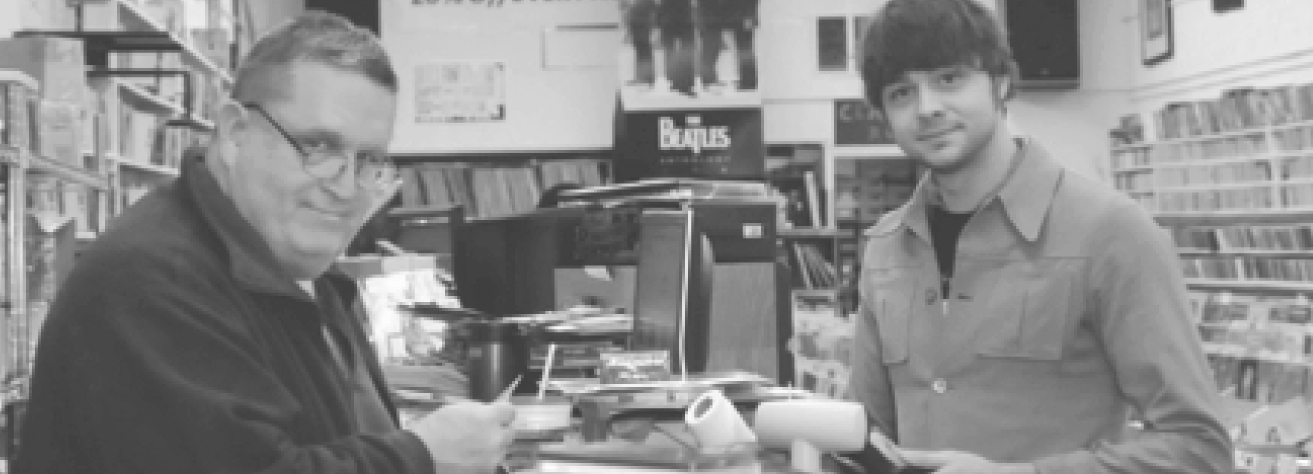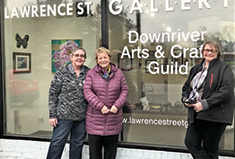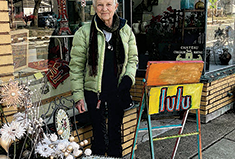Record Collector’s 30th Anniversary
Remember those first few seconds of silence, as the tension slowly built just before the first track hit your ears and hooked you in, urging you to listen on? That’s the “lead in,” the shiny black part at the outer edge of the record.
…And then the journey of the needle began down the spiral, through every track and towards the center on one looong groove. This story is essentially about one extraordinarily long groove – it’s about The Record Collector’s non-stop groovy groove, which has kept Detroit vinyl junkies high for 30 years.
Happy Dirty 30, Record Collector! You made it through the economic trenches of the ‘80s, ‘90s, and ‘00s, thanks to the leadership of Warren Westfall.
“It has an indefinable spiritual value. It’s part of our DNA. We’re wired for language, we’re wired for religion; we’re wired for music. No other species has anything like that,” said Westfall, owner of The Record Collector, Ferndale’s only (used) record store at 327 West Nine Mile.
One after another, metro Detroit record stores have kicked the bucket. Why? “There are people that want this stuff, but one has to understand that stores close.
The consumer makes choices, and I sell buggy whips in the era of the automobile,” said Westfall. “The technological paradigm has changed to one of downloading and streaming, so why would you want to have hard copy? Hard copy becomes a distraction that they [kids] don’t see a necessity for.”
 It’s true. The scenario: You’re in the mall and you hear a song come over the speakers that moves you, so you hold your iPhone up and Shazam it. Next, you happily identify the mystery song. Then, you quickly find it on iTunes, buy it and play it in the car on the way home from the mall. What a luxury!
It’s true. The scenario: You’re in the mall and you hear a song come over the speakers that moves you, so you hold your iPhone up and Shazam it. Next, you happily identify the mystery song. Then, you quickly find it on iTunes, buy it and play it in the car on the way home from the mall. What a luxury!
Not according to a real listener of music. “Audiophiles” like Westfall say that “There’s a presence and a dimension that you hear that you would never get any other way” when listening to a record—especially the highs and lows. “We think this is important, we can’t get enough. We want to know all the nuances. It becomes a sort of obsessive/ compulsive dimension,” said Westfall.
Westfall’s music career commenced spinning at Harmony House one day, after a store manager witnessed his natural ability to sell Irish albums to fellow shoppers. After that three-year adventure, he did a spell at Full Moon in Pontiac and then ended up at Sam’s Jams in the summer of 1981. His enthusiasm led him down yet another path, and
with a little help from family he started The Record Collector in northwest Detroit.
“It was in a black neighborhood. I wanted to buy used records and I wanted to make it clear, so The Record Collector seemed pretty obvious. Not very imaginative, but to the point,” he said. “I didn’t do new records, really. Being in Detroit, Motown, as far as a new product, was over.”
But when he did carry new stuff he “was probably one of the only places in the city that focused more on carrying catalogue. Older stuff. Because in the city, none of the black stores carried any of the older stuff.” Westfall carried old R&B and some rock, “but for the most part northwest Detroit was predominantly black and I was going more for black records. It was also a crossover for whites who wanted black records,” he said.
Westfall continued to build his cross-cultural music bridge when he opened shop in Ferndale in 1997 at its current location, nestled right next to the Bangkok Café and across the street from Assaggi Bistro. The shelves are stocked with loads of vinyl – the RC sells CDs, DVDs and cassette tapes too.
“We have some die-hards who have cassette players in their car,” said Mike Ross, who’s worked at the store for ten years. Ross is also an eyewitness to economic business trends in the used marketplace. “The recession hasn’t affected us too much. I think it’s because we’re in the used business. I don’t want to say necessarily that we’ve done better, but I think with the economy being down people don’t go out and buy new things. So they’re more likely to come in here and buy something used,” said Ross.
Other vinyl victors, like Record Graveyard in Hamtramck, could very well be experiencing the same positive trend, but many have fallen victim to the changing economic and audio world—like classic favorites Car City Records and Record Time.
“This whole thing about vinyl coming back – it’s a nice conversation, but the reality is that there are fewer and fewer people buying it. It used to be that every white boy with two turntables was a DJ, and I just don’t see them a lot anymore,” said Westfall.
BUT – “white boys with two turntables” do, in fact, exist in this mp3-pandemic world. Ferndale Friends caught up with one of these rare, Detroit species to get an angle on modern day collecting and DJ-ing.
“Going to record stores is like going to the casino. You never know whether you’re going to hit or not,” said connoisseur of fine, quality music, Brian Gillespie. “I like the Record Collector because I can go in there and buy obscure records. I’ve found some great jazz records there and some good 12-inches back in the day. We’re talkin’ like ten years ago. I’ve found some funk records. I found a good Dorothy Ashby record there that was reasonably-priced. Original copy. The people who know music know that’s rare,” said Gillespie. Ashby was legendary on the jazz scene for decades.
Like a rare book librarian who examines, cleans and catalogues the master works, Westfall knows the nitty-gritty on record lore and care.
“I’ve always thought that a record store can make a difference in a community, much like a library. And my knowledge is a resource,” said Westfall. Gillespie agrees. “You have to have these small record stores. It’s an education. You have to teach the youth. It’s the art form of it. You’re holding the physical object.”
Gillespie, who DJs all over Detroit and beyond, called Westfall “a survivor” and depends on stores like his for not only his livelihood but also his hobby and passion. “It’s the love of fine music. There’s so much right here in Metro Detroit. People buy records from all the way on the East Side to way down Grand River. There’s so much heritage and music here in Detroit that it’s crazy. It’s so above par that people from all over the world come here to buy records,” said Gillespie.
Vinyl revival? “If you go from one-percent to two-percent of the industry, it’s a revival okay. It’s still only two-percent,” said Westfall with a laugh.
So what about these retro turntables with USB ports and CD converters that Crosley is shelving at Target and Urban Outfitters? “You get what you pay for. Cartridges matter, the arm matters when it comes to reproducing records. The needles, the styluses…” said Westfall.
He continued, “Vinyl requires commitment. Intro level audiophile turntables start at around $400,” he said—in comparison to the cheap models at the big box stores.
“Crosleys are consumer grade and for most people that meets their needs. But most of us who want better sound, speakers, amplifiers, good styluses. We’ll spend.” However, “It’s declining, the amount of audio stores. Up there on 14 and Woodward you have Audio Dimensions, Almas…I’m not sure if there’s anybody else left up there. That used to be audio ghetto up there, now it’s just two or three stores left. You’re alternative is what, Best Buy? ‘No highs no lows, it must be Bose.’ It kind of smashes the high and low and gives you a solid mid. It doesn’t give you accurate sound.
“I’m clear that I have a problem. My problem is that this stuff really means something to me. It’s not like the background, or the piece of clothing that I’m wearing this week, or this week’s pop tune. There’s a more transcendental thing to be achieved,” said Westfall.
As our conversation drew to a close, we walked Nine Mile back towards the store and Westfall pointed to his glass window storefront. “See what it says on there,” he said. We’re committed to making a difference in your listening. “That’s what I’m about.”
Remember when you had to “wake up,” as Westfall says, and walk over to the record when the needle hit that shiny circle in the middle? —that’s the “lead-out,” the end of the record. Time to flip the vinyl and listen to side two.
Like a rare book librarian who examines, cleans and catalogues the master works, Westfall knows the nitty-gritty on record lore and care.
“I’ve always thought that a record store can make a difference in a community, much like a library. And my knowledge is a resource,” said Westfall. Gillespie agrees. “You have to have these small record stores. It’s an education. You have to teach the youth. It’s the art form of it. You’re holding the physical object.”
Gillespie, who DJs all over Detroit and beyond, called Westfall “a survivor” and depends on stores like his for not only his livelihood but also his hobby and passion. “It’s the love of fine music. There’s so much right here in Metro Detroit. People buy records from all the way on the East Side to way down Grand River. There’s so much heritage and music here in Detroit that it’s crazy. It’s so above par that people from all over the world come here to buy records,” said Gillespie.
Vinyl revival? “If you go from one-percent to two-percent of the industry, it’s a revival okay. It’s still only two-percent,” said Westfall with a laugh.
So what about these retro turntables with USB ports and CD converters that Crosley is shelving at Target and Urban Outfitters? “You get what you pay for. Cartridges matter, the arm matters when it comes to reproducing records. The needles, the styluses…” said Westfall.
He continued, “Vinyl requires commitment. Intro level audiophile turntables start at around $400,” he said—in comparison to the cheap models at the big box stores.
“Crosleys are consumer grade and for most people that meets their needs. But most of us who want better sound, speakers, amplifiers, good styluses. We’ll spend.” However, “It’s declining, the amount of audio stores. Up there on 14 and Woodward you have Audio Dimensions, Almas…I’m not sure if there’s anybody else left up there. That used to be audio ghetto up there, now it’s just two or three stores left. You’re alternative is what, Best Buy? ‘No highs no lows, it must be Bose.’ It kind of smashes the high and low and gives you a solid mid. It doesn’t give you accurate sound.
“I’m clear that I have a problem. My problem is that this stuff really means something to me. It’s not like the background, or the piece of clothing that I’m wearing this week, or this week’s pop tune. There’s a more transcendental thing to be achieved,” said Westfall.
As our conversation drew to a close, we walked Nine Mile back towards the store and Westfall pointed to his glass window storefront. “See what it says on there,” he said. We’re committed to making a difference in your listening. “That’s what I’m about.”
Remember when you had to “wake up,” as Westfall says, and walk over to the record when the needle hit that shiny circle in the middle? —that’s the “lead-out,” the end of the record. Time to flip the vinyl and listen to side two.
If some happened with our soundness, we believe there is a solution to any maladies in a medicament. What medicines do patients purchase online? Viagra which is used to treat impotence and other states connected to erectile dysfunction. Learn more about “sildenafil“. What humanity talk about “viagra stories“? The most substantial aspect you have to look for is “sildenafil citrate“. Such problems commonly signal other problems: low libido or erectile dysfunction can be the symptom a strong soundness problem such as core trouble. Causes of sexual dysfunction include injury to the penis. Chronic disease, several medicaments, and a status called Peyronie’s disease can also cause sexual dysfunction. Even though this medicine is not for use in women, it is not known whether this treatment passes into breast milk.



